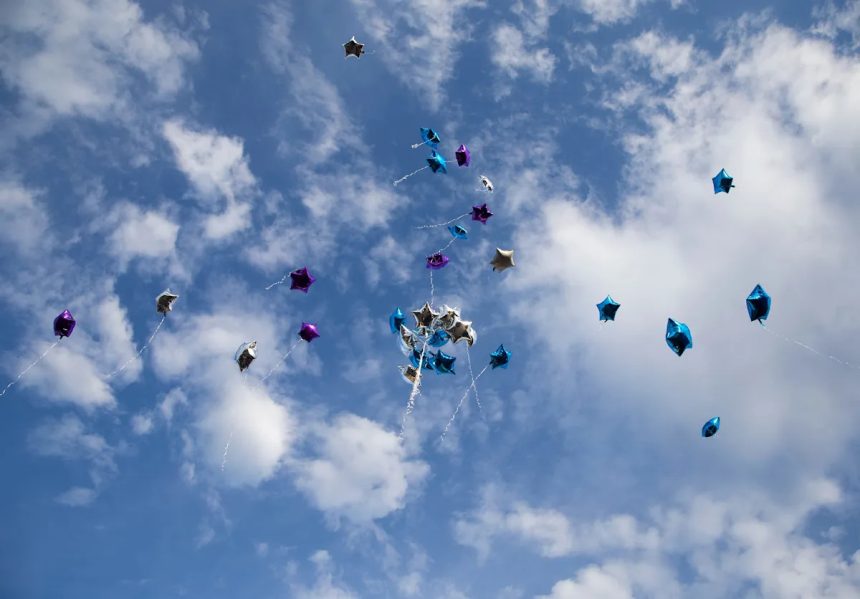Balloon releases can honor the passing of a loved one or celebrate a big moment, but lawmakers who want to ban them say the environmental and safety risks are too high.
State lawmakers are considering a bill to prohibit the release of 10 or more Mylar balloons, which have a foil-like, metallic coating that acts as a conductor when caught in a power line, creating a short circuit. An Assembly committee held a public hearing for the measure Sept. 25.
“Once our community understands the harm that Mylar balloons cause to our infrastructure and environment, people become supportive of efforts to control the release of them,” said state Sen. Tim Carpenter, a Democrat from Milwaukee. “After this hearing was scheduled, over a dozen constituents contacted me with words of support.”
The bill would impose a $500 fine, in line with Milwaukee’s littering ordinance, with exceptions for balloons released indoors or for scientific or meteorological purposes. As written, the bill wouldn’t ban releases of latex balloons, which also take a long time to break down in the environment.
Committee chair Rep. Joy Goeben, a Republican from Hobart, asked whether the bill should prohibit releases of all balloons, regardless of the number or material. Carpenter said he would be open to a stricter bill if other lawmakers support it.
State Rep. Christine Sinicki, a Democrat from Milwaukee, said the legislation is a “reasonable compromise, acknowledging the cultural and emotional significance that balloon releases can hold.”
At least 10 states have laws banning outdoor balloon releases, and most don’t specify the material of balloon. Some prohibit the release of just one balloon, while others increase fines based on the number of balloons. In Maine, releasing more than 24 balloons can come with a $500 fine and 100 hours of community service.
According to We Energies, which supports the bill, Mylar balloons have knocked out power for more than 120,000 customers since 2020. In 2025, nearly 14,000 customers have lost power for a total of 153,000 minutes because of the balloons, according to the utility company.
The short circuit from balloons can also cause power lines to fall to the ground, creating fire hazards and dangerous situations, We Energies said.
More: Balloons disrupted power for 2,000 customers in Milwaukee over the weekend
Twelve lawmakers, all Democrats, have signed on in support of the bill. That’s somewhat unusual — committees in the Republican-led Legislature seldom hold hearings for legislation led by Democrats. It’s still no guarantee that the bill will pass the Assembly and Senate and become law.
Milwaukee County officials support the legislation
Local leaders are also pushing for the legislation — the Milwaukee County Board unanimously passed a resolution supporting the state bill. County Executive David Crowley, who’s running for governor, signed it Sept. 24.
Milwaukee County supervisors, in their resolution, acknowledged balloon releases “are a popular way to observe the passing of a loved one or to celebrate a milestone.” Community members have suggested alternatives such as blowing bubbles, flying kites or planting trees.
The resolution also calls on the Parks Department to provide information to the public about the negative impacts of balloon releases on county parks.
Previously, the Milwaukee Police Department said it’s up to an officer’s discretion whether to issue citations for balloon releases under the city’s current littering ordinance. The city attorney wasn’t aware of any such citations.
More: You ask, we answer: Is releasing balloons considered littering in Wisconsin?
Carpenter acknowledged some police officers “will enforce it more than others” but the intention isn’t to arrest a “97-year-old woman and a 3-year-old kid for releasing a balloon.”
“By passing this bill and getting it signed into law, it’ll help educate people,” Sinicki said. “I don’t think we’re going to expect law enforcement to actually hunt these people down.”
This article originally appeared on Milwaukee Journal Sentinel: Wisconsin lawmakers consider limiting, banning Mylar balloon releases









